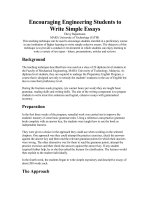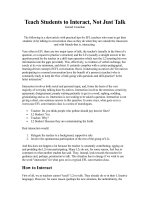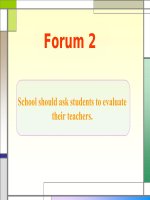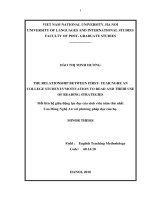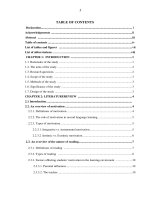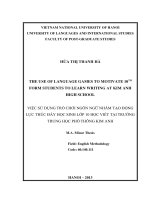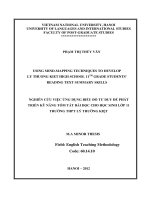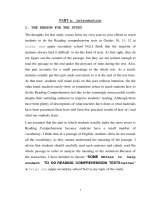Guiding students to use proper skills to solve multiple choice exercises relating to closest and opposite meanings
Bạn đang xem bản rút gọn của tài liệu. Xem và tải ngay bản đầy đủ của tài liệu tại đây (121.76 KB, 17 trang )
THANH HOA EDUCATION AND TRAINING DEPARTMENT
TRIEU SON 1 UPPER SECONDARY SCHOOL
EXPERIENCE INITIATIVE
GUIDING STUDENTS TO USE PROPER SKILLS TO
SOLVE MULTIPLE-CHOICE EXERCISES RELATING TO
CLOSEST AND OPPOSITE MEANINGS
Writer: Nguyễn Thị Cương
Position: Teacher
Subject: English
THANH HOA, YEAR 2019
1
CATEGORY
1. Introduction
1.1. Reasons for choosing the topic
1.2. Purposes of research
1.3. Objects of research
1.4. Methods of research
2. Content
2.1. Theoretical basis
2.2. Factual basis
2.3. Solutions.
2.3.1. Skills of doing exercises about symnonyms and antonyms
a. Guessing/ infering the meaning
b. Ruling out
2.3.2. Types of exercises
2.3.3. Principles of teaching exercises related to symnonyms and antonyms
2.3.4. Some selected exercises
2.4. Experimental results
3. Conclusion and proposal
3.1. Conclusion
3.2. Proposal
2
1. Introduction
1.1. Reasons for choosing the topic
In recent years, English has become a compulsory subject in secondary
education programme and it is one of three main subjects in GCSE
examinations. Multiple –choice exercises are common ones that are used in
many sorts of tests and examinations, especially in GCSE examinations and
examinations for gifted students. In a GCSE test, symnonymous and
antonymous exercises account for about 15% to 20% the total questions
including 4 questions in vocabulary part and from two to five ones scatering in
reading comprehension part, and three questions in writing part .
However, the knowledge used in this kind of exercises is broad so it is not
easy for students to do them perfectly. In addition, “disturbed option” is a
noticeable factor that teachers have to guide them how to guess the meaning or
rule out the wrong options.Therefore, teachers need to carefully design or select
questions suitable to them. Morever, tutors should guide learners to acquire
some skills to guess the meanings of the words/ phrases or idioms based on the
context in case they meet completely new words so that they can choose the
right answers.When they can acquire necessary skills to do this kind of exercises
, it will help them get ready for the examination. It means that doing well this
kind of practice will help students get certain scores, which contribute to their
total mark. Besides, this kind of vocabulary is very useful in doing other parts in
the test. Morever,knowing more vocabulary with different meaning assists
people to use English more correctly. However important it is, this area of
knowlegde has not received much attention.
Therefore; I choose the topic " Guiding students to use proper skills to
solve multiple-choice exercises relating to closest and opposite meanings"
in my experience initiative to help them reinforce and practise vocabulary
effectively and achieve good results in the exams.
1.2. Purposes of research.
In the framework of this topic, I do not hope to solve all the exercises of
symnonyms and antonyms. I focus only on guiding and solving a number of
exercises such as matching, odd-one out, multiple questions….. using some
skills to solve these exercises to help students get ready for GCSE examination.
1.3. Objects of research.
As what has been refered above, symnonyms and antonyms account for
about 15% of the whole questions in an English tests, especially in the gifted
student examination and GCSE examination. These questions are usualy at high
level and students have difficulties in doing them.
From my experiences in teaching and guiding process in which I help my
students to prepare for the gifted student examination and GCSE examination, I
am pleased to introduce some ways of teaching students to solve exercises about
symnonyms and antonyms.
3
I applied this experience initiative for teaching students at Trieu Son 1
upper school. They are students of classes 10A8,11C8 and 12B8.
1.4. Methods of research
Complete the system of theoretical basis, basic knowledge, guide the
approach to problems, analysis, evaluation and conclusions related to these
exercises.
Applying this experience to students through semester tests, mock tests
for GCSE, and surveys of the quality of the school's gifted students. Report the
topic to the professional team to get suggestions and comments. I myself have
consulted some opinions of colleagues who have much experience in teaching,
and specially interest in vocabulary.
2. Content
2.1. Theoretical basis.
Vocabulary is very important in a language and so is it in English.English
has a variety of synonyms and antonyms and they are widely used, especially in
the English test of GCSE examination, they accounts for 15% of the total score.
However, they seem to be difficult . When learning it, students find it very hard
to remember a lot of words and they tend to ignore vocabulary exercises. In
examinations, when scoring their papers, we realize that, many students choose
incorrect answers for these questions. In my topic, I only focus on some
theoretical problems, some basic exercises and some simple ways to teach
antonymous and symnonymous words so that the students can do the exercises
related in English.
2.2. Factual basis.
I researched this topic based on the following aspects:
- Based on factual teaching.
- Based on some references about vocabulary.
- Based on the opinions of the colleagues.
Before making the topic, I had a test to examine the quality of the students
of the classes 10A8,11C8 and 12B8 at Trieu Son I high school. I obtained the
following results:
Class Number
Excellent
Good
Average
Weak
of
Number of % Number of %
Number of % Number of
students students
students
students
students
10A8
50
5
10
16
32
15
30
14
11C8
42
3
7
13
31
14
33.4
12
12B8
41
4
10
12
29.2
11
26.8
14
2.3. Solutions.
2.3.1. Skills of doing exercises about symnonyms and antonyms.
To do these exercises correctly, students need to acquire some necessary skills.
If the exercises are simple enough, which means the words given are
understandable and the context is not difficult, students can do them smoothly.
4
%
2
28.6
34
However, if the given words/ phrases/ sentences are at higher levels, they need
to apply the following ways.
a. Guessing/ infering the meaning.
This is an important skill when doing a test. Most of the English tests
include a great amount of vocabulary, so there may appear difficult and
unfamiliar words. In this situation, students have to guess or infer their meanings
basing on the context.
Examples:
Choose the best word/phrase that is CLOSEST in meaning to the
underlined part in the following question. [5]
Because Jack defaulted on his loan, the bank took him to court.
A. failed to pay
B. paid in full
C. had a bad personality
D. was paid much money
In this example, “ defaulted” is a difficult word and not many students know
what it means. However, the phrases: “his loan” and “the bank took him to the
court” can enable students to infer its meaning and choose its symnonym which
is option A.
His greatest period of productivity occurred between 1876 and 1890 ,
during which time he enjoyed the patronage of Madame Von Meck , a woman
he never met , who gave him a living stipend of about 1,000 a year.[4]
The phrase “ enjoyed the patronage of ” probably mean _____ .
A. was mentally attached to
B. liked the company of
C. was financially dependent on
D. received advice from
In this example, “ enjoyed the patronage of ” is an unfamiliar phrase and it is
not easy to guess the meaning if standing alone. With the following clause “who
gave him a living stipend of about 1,000 a year”, people can infer its meaning
and choose C as the correct answer.
b. Ruling out.
With questions followed by disturbed options, “ruling out” is a necessary skill.
From the meaning of the words and context, grammatical structures or signs,
students must carefully read and analyse each option to make the correct choice.
Examples:
Choose the best word/phrase that is OPPOSITE in meaning to the
underlined part of the following question. [5]
As an educationalist, he was held in very high esteem.
A. attended
B. much admired C. much respected
D. scorned
In this example, the idiom “held in very high esteem” can be understood basing
on the context. Therefore, students can rule out two options B,C that relating to
its meaning at first. Then, option A can not be the correct answer because its
meaning does not belong to two terms: symnonym or antonyms. As a result, D
will be the right choice.
5
Mark the letter A, B, C, or D on your answer sheet to indicate the sentence
that is closest in meaning to the underlined part of the following question.
[6]
As soon as he approached the house, the policeman stopped him.
A. No sooner had he approached the house than the policeman stopped him.
B. Hardly had he approached the house than the policeman stopped him.
C. No sooner had he approached the house when the policeman stopped him.
D. Hardly he had approached the house when the policeman stopped him.
This example consists of some disturbed options, so students need to be
carefully.
The four options start with “ Hardly” or” No sooner” which are two forms of
inversion. Basing on their structures, “ Hardly had +S +p.p +when+ S + Ved”
and “ No sooner had +S +p.p +than+ S + Ved” students can rule out options B,C
and D.
2.3.2. Types of exercises.
There also have some parts of knowledge that can be used in this multichoice question form. They can belong to the following:
- Vocabulary part
- Vocabulary in reading part
- Sentence transformation/writing
Teachers need to devide students into two groups: weak or average
students and good or excellent students before designing exercises.
For weak or average students, teachers need to design exercises with
simple and popular words/ sentences for them to do.
Examples:
Vocabulary: These words or phrases are ones that they have learnt in textbook.
There may be some easy phrasal verbs or idioms. Designers have to make sure
that the given words/ phrases must be used in understandable sentences then
students can choose or guess the answers basing on the context.
Exercise 1: Choose the best word/phrase that is CLOSEST in meaning to
the underlined part in each of the following questions.
1. Women whose husbands do not contribute to the domestic chores are more
vulnerable to illness. [2]
A. able to be well protected
B. able to be easily hurt
C. able to be well known
D. able to be equally treated
2. In many cultures, the mother is usually the homemaker while the father is the
breadwinner. [3]
A. the family member who is willing to share the domestic chores
B. the family member who likes bread
C. the family member who is responsible for childcare
D. the family member who earns money to support the family
3. The stone stelea were engraved with the names of the top students in royal
examinations. [1]
6
A. printed
B. carved
C. washed
D. written
4.We enjoy spending time together in the evening when the family members get
together in the living room after a day of working hard. [3]
A. gather
B. watch TV
C. chat
D. tell jokes
Keys: 1. B
2. D
3.B
4.A
Exercise 2: Choose the best word/phrase that is OPPOSTE in meaning to
the underlined part in each of the following questions.
1. She got up late and rushed to the bus stop. [3]
A. came into
B. went leisurely C. went quickly
D. dropped by
2. Our well-trained staff are always courteous to customers. [2]
A. polite
B. friendly
C. helpful
D. rude
3. Everything went smoothly at first. [2]
A. fluently
B.seriously
C. easily
D. uneasily
Keys: 1. B
2.D
3.D
Reading.
Exercise : Read the following passage and mark the letter A, B, C, or D on
your answer sheet to indicate the correct answer to each of the questions [4]
In the United States, people greet each other with a handshake in a formal
introduction. The handshake must be firm. If the handshake is weak, it is
a sign of weakness or unfriendliness. Friends may place a hand on the
other's arm or shoulder. Some people, usually women, greet a friend with
a hug. Americans shake their index finger at children when they scold
them and pat them on the head when they admire them. Learning a
culture's body language is sometimes confusing. If you don't know what
to do, the safest thing to do is to smile.
1. In the paragraph, the word firm in the first paragraph refers to ________
A. tight
B. small
C. light
D. fast
2.Which of the following is OPPOSITE in meaning with admire in the
paragraph ?
A. like
B. look up to
C. memorialize
D. look down on
3.Which of the following is OPPOSITE in meaning with confusing in the
paragraph ?
A. easy to understand
B. difficult to understand
C. convenient to understand
D. comfortable to understand
4. In the paragraph, the word scold in the first paragraph refers to ________
A. reproach
B. blame
C. compliment
D. accuse
Keys: 1. C
2.D
3. A
Writing: Teachers should design or select exercises with some basic structures
such as: because and because of, although and in spite of/ despite, in order to/ so
as to, so that/ such that, conditional sentences type 1,2,3, tenses
Exercise : Mark the letter A, B, C, or D on your answer sheet to indicate
the sentence that is closest in meaning to each of the following questions. [5]
1. She was so busy that she couldn’t answer the phone.
7
A. She was very busy that she couldn’t answer the phone.
B. She was too busy to answer the phone.
C. She was too busy not to answer the phone.
D. She was very busy so that she couldn’t answer the phone
2. I have never talked to the headmaster before .
A. It’s the first time I ever talked to the headmaster
B. It’s the first time I had ever talked to the headmaster.
C. It’s the first time I have ever talked to the headmaster.
D. It’s the first time I will ever have talked to the headmaster.
Keys:
1. B
2.C
For good and excellent students, teachers need to design exercises with more
difficult words/ phrases/ structures.
Vocabulary: Pay much attention to academic words,phrasal verbs and idioms.
These words or phrases are special ones that they have to guess or infer the
meanings basing on the context.
Exercise 1: Choose the best word/phrase that is CLOSEST in meaning to
the underlined part in each of the following questions. [5]
1. She’s been down in the mouththe whole morning.
A. hungry
B. sad
C. talkative
D. ill at ease
2. I couldn't believe it was true, but there it was, in black and white.
A. in print
B. written down C. with evidence D. under proof
3. Because Jack defaulted on his loan, the bank took him to court.
A. failed to pay
B. paid in full
C. had a bad personality
D. was paid much money
Keys: 1. B
2.B
3. A
Exercise 2: Choose the best word/phrase that is OPPOSITE in meaning to
the underlined part in each of the following questions. [6]
1. His career in the illicit drug trade ended with the police raid this morning .
A. elicited
B. irregular
C. secret
D. legal
2. As an educationalist, he was held in very high esteem.
A. attended
B. much admired C. much respected
D. scorned
3. The first boy gave a quick-witted reply.
A. nonsensical
B. silly
C. tepid
D. intelligent
Keys: 1. D
2.D
3.B
Reading.
Exercise : Read the following passage and mark the letter A, B, C, or D on
your answer sheet to indicate the correct answer to each of the questions [5]
Gradually people learned they could start a fire without traveling far to find
flames. They rubbed two pieces of wood together. This method was used for
thousands of years. When people became used to making fires with which to
cook food and stay warm at night, they found that certain resins or gums from
trees burnt longer and brighter. They melted resins and dipped branches in the
liquid to make torches that lit their homes at night. Ironstands in which torches
8
used to be fixed can still be seen in old buildings of Europe. There was no
lighting in city streets until gas lamps, and then electric lamps were installed.
Boys ran about London at night carrying torches of burning material. They were
called torch boys, or link boys, and earned a living by guiding visitors to friends’
houses at night.
For centuries homes were lit by candles until oil was found. Even then, oil lamps
were no more effective than a cluster of candles. We read about the splendors
and marvels of ancient palaces and castles, but we forget that they must have
been gloomy and murky places at night.
1. The word “splendors” in the passage could be best replaced by which of the
following?
A. expensive objects
B. places of scenic beauty
C. achievements
D. the beautiful and impressive features
2. The word “gloomy” in the passage is closest in meaning to
A. nearly dark
B. badly decorated
C. containing a lot of white
D. mysterious
Keys:
1. D
2.A
Writing: Teacher must pay much attention to difficult and unpopular structures
such as: inversion, subjunctive mood, advanced types of conditional sentences,
clauses……
Exercise : Mark the letter A, B, C, or D on your answer sheet to indicate
the sentence that is closest in meaning to each of the following questions.
1. I did not come to your party due to the rain.
A. If it did not rained, I would come to your party.
B. It was the rain that prevented me from coming to your party.
C. Even though it rained, I came to your party.
D. Suppose it did not rain, I would come to your party.
2. As soon as he approached the house, the policeman stopped him.
A. No sooner had he approached the house than the policeman stopped him.
B. Hardly had he approached the house than the policeman stopped him.
C. No sooner had he approached the house when the policeman stopped him.
D. Hardly he had approached the house when the policeman stopped him.
Keys: 1. B
2.D
2.3.3. Principles of teaching exercises related to symnonyms and antonyms.
When teaching symnonyms and antonyms, teachers must adhere to five
following principles.
- All teachers' instructions must be detailed, clear and specific. If the instructions
are not specific and generic, students will not know how to perform their tasks
and the task is easy to fail. The most important part of this section is to guide
students to find resources to look up synonyms and antonyms and quick and
effective ways to look up. The main source is English-English dictionaries and
dictionaries specializing in synonyms and antonyms. Students can look up
dictionaries with printouts or dictionaries on the Internet. The quick way to look
9
up for compound words not included in the dictionaries is to look up from the
root, then determine the definition of the same word prefix, its suffix.
- Stick to principle “Student-centered”, boldly assigns students groups to
learn about synonyms and antonyms in specific lessons. This principle helps
students take the initiative, actively participate in the lesson and help develop
their teamwork skills and presentation skills. Assigning the study of synonyms
and antonyms in a certain lesson to students causes students to brainstorm,
actively embark on a task and thereby actively memorize vocabulary.
- Focus on monitoring the progress of the groups, comparing and
evaluating the results. Monitoring the progress of each group will help teachers
evaluate and comment more accurately on the results of each group. In addition,
teachers can promptly provide appropriate help for disadvantaged groups.
- Teachers play a major role in synthesizing, modifying and
supplementing the results of groups. This is the period when teachers play a key
role to ensure that they provide adequate and accurate knowledge to their
students.
- Teachers should regularly test, comment and evaluate the ability of
students in applying the knowledge of synonyms to speak and write English.
This is the principle of "learning with practice",which encourages students to
use the knowledge they already have in speaking and writing production skills.
This must be done regularly to form a habit of using a student's foreign
language.
2.3.4. Some selected exercises.
Exercise 1: Choose the best word/phrase that is CLOSEST in meaning to
the underlined part in each of the following questions. [5]
1. Laws on military service since 1960 still hold good.
A. is in good condition
B. remains for good
C. stands in life
D. remains in effect
2. In astronomy, a scale of magnitude from one to six denotes the brightness of
astar.
A. signifies
B. predicts
C. contrasts
D. examines
3. Don’t you ever mention that matter again. I will not hear anything of it.
A. touch on
B. put off
C. take in
D. go on
4. It was too late to stop the panic that had resulted from the false news report.
A. enthralled
B. ensured
C. ensued
D. entailed
5. The newscaster gave a concise account of the strategy.
A. complicated and intricate
B. short and clear
C. sad and depressing
D. long and detailed20
6. Married couples can get a divorce if they find they are not compatible.
A. able to share an apartment or house
B. able to budget their money
C. capable of living harmoniously
D. capable of having children
7. There is no thing to make it likely or certain that he will be at the party.
A. proof
B. promise
C. guarantee
D. fact
10
8. The dog is not well. We have to take it to see the person who treats sick
animals.
A. zoologist
B. horticulturist C. veterinarian
D. veteran
9. In Africa, many children die from not having enough food.
A. poverty
B. starvation
C. drought
D. malnutrition
10. Give me a not long account of what happened.
A. compact
B. terse
C. brief
D. condensed
Keys:
1.D
2. A
3.A
4.C
5.B
6. C
7. C
8.C
9.B
10.C
Exercise 2: Choose the best word/phrase that is OPPOSITE in meaning to
the underlined part in each of the following questions. [6]
1. His new work has enjoyed a very good review from critics and readers.
A. viewing
B. opinion
C. regard
D. look
2. Such problems as haste and inexperience are a universal feature of youth.
A. marked
B. separated
C. shared
D. hidden
3. We have lived there for years and grown fond of the surroundings. That is
why we do not want to leave.
A. loved the surroundings
B. planted many trees in the surroundings
C. possessed by the surroundings
D. haunted by the surroundings
4. Although they hold similar political views, their religious beliefs present a
striking contrast.
A. minor comparison
B. interesting resemblance
C. significant difference
D. complete coincidence
5. These were the people who advocated using force to stop school violence.
A. openly criticised
B. publicly said
C. publicly supported
D. strongly condemned
6. Within a week on display at the exhibition, the painting was hailed as a
masterpiece.
A. an expensive work of art
B. a down-to-earth work of art
C. an excellent work of art
D. a large work of art
7. The repeated commercials on TV distract many viewers from watching their
favourite films.
A. businesses
B. advertisements C. economics
D. contests
8. As tourism is more developed, people worry about the damage to the flora
and fauna of the island.
A. flowers and trees
B. plants and animals
C. mountains and forests
D. fruits and vegetables
9. It is such a prestigious university that only excellent students are entitled to
a full scholarship each year.
A. have the right to refuse
B. are refused the right to
C. are given the right to
D. have the obligation to
10. The works of such men as the English philosophers John Locke and Thomas
Hobbes helped pave the way for academic freedom in the modern sense.
11
A. terminate
B. prevent
C. lighten
D.initiate
Keys:
1.B
2.C
3.A
4.C
5.C
6.C
7.B
8.B
9. C
10.D
Exercise 3 : Read the following passage and mark the letter A, B, C, or D on
your answer sheet to indicate the correct answer to each of the questions [4]
What is alarming about the case of the Bengal tiger is that this extinction will
have been caused almost entirely by poachers who, according to some sources,
are not always interested in material gain but in personal gratification. This is an
example of the callousness that is contributing to the problem of extinction.
Animals such as the Bengal tiger, as well as other endangered species, are
valuable parts of the world’s ecosystem. International laws protecting these
animals must be enacted to ensure their survival – and the survival of our planet.
Countries around the world have begun to deal with the problem in
various ways. Some countries, in an effort to circumvent the problem, have
allocated large amounts of land to animals reserves. They then charge admission
prices to help defray the costs of maintaining the parks, and they often must also
depend on world organizations for support. This money enables them to invest
in equipment and patrols to protect the animals. Another response to the increase
in animal extinction is an international boycott of products made from
endangered species. This has had some effect, but by itself it will not prevent
animals from being hunted and killed.
1. The word “poachers” could be best replaced by which of the following ?
A. Concerned scientists
B. Enterprising researchers
C. Illegal hunters
D. Trained hunters
2. The word “callousness” could be best replaced by which of the following ?
A. incompetence B. indirectness
C. insensitivity
D. independence
3. Which of the following could best replace the word “allocated” ?
A. set aside
B. combined
C. taken
D. organized
4. What does the term “international boycott” refer to ?
A. A global increase in animal survival
B. A refusal to buy animal products worldwide
C. Defraying the cost of maintaining national parks
D. Buying and selling of animal products overseas
Keys:
1. C
2. C
3.A
4. B
Exercise 4: Mark the letter A, B, C, or D on your answer sheet to indicate
the sentence that is closest in meaning to each of the following questions.[5]
1. I have never seen this film before.
A. Never before have I seen this film
B. Never before I have seen this film
C. Before have never I seen this film
D. Have I never before seen this film
2. My sister is often sick because she doesn’t do physical exercise.
A. If my sister does physical exercise, she won’t often be sick.
B. If my sister isn’t physical exercise, she does sick.
C. If my sister did physical exercise, she wouldn’t often be sick.
12
D. If my sister wasn’t physical exercise, she would do sick.
3. I did not answer the door even though I knew it was my friend.
A. Unless I knew it was my friend, I would not answer the door.
B. I knew it was my friend, but I did not answer the door.
C. Only when I answered the door did I knew it was my friend.
D. I answered the door since I knew it was my friend.
4. Julie and Anne had not met each other before he party.
A. The party was the place where Julie and Anne could not meet each other.
B. The party prevented Julie and Anne from meeting each other.
C. Julie and Anne got acquainted when they were at the party.
D. Julie and Anne used to meet each other for the party.
5. I have seldom heard such a talented singer.
A. Seldom have I heard such a talented singer.
B. Seldom I have heard such a talented singer.
C. Seldom has I heard such a talented singer.
D. All are correct.
Keys: 1. A
2.C
3.B
4.C
5.A
Exercise 5: Mark the letter A, B, C, or D on your answer sheet to indicate
the sentence that is closest in meaning to each of the following questions.[6]
1. Mr. Brown said, “Could you please wait here about half an hour?”
A. Mr. Brown asked me if I had been able to wait there about half an hour.
B. Mr. Brown asked me if I could wait there about half an hour.
C. Mr. Brown asked me to wait there about half an hour.
D. Mr. Brown asked me if I was pleased to wait there about half an hour.
2. Alice and Charles did not decide to move to a bigger house until after the
birth of their second child.
A. Only when Alice and Charles had their second child, they decided to move to
a bigger house.
B. Only when Alice and Charles had their second child that they decided to
move to a bigger house.
C. Only when Alice and Charles had their second child did they decide to move
to a bigger house.
D. Only when had Alice and Charles had their second child than they decided to
move to a bigger house.
3. The spectators were so excited to see the race that they did not pay so much
attention to that little incident.
A. Such excitement were the spectators to see the race that they did not pay
attention to that little incident.
B. So excited were the spectators to see the race that they didn’t pay so much
attention to that little incident.
C. The spectators paid full attention to the race with excitement, so they didn’t
realize that little incident.
13
D. The spectators did not pay so much attention to that little incident because
they were excited to see the race.
Keys:
1. C
2. C
3.B
2.4. Experimental results
In my teaching process in the shool year 2018- 2019, I applied this topic in
my teaching for students in three grades: grade 10 th, 11th and12th . As a result, it
has been proved to be effective. It has made students more confident to do
exercises. They don’t avoid doing them any more. Especially, I have four
students who attended the examination for gifted students organized by Thanh
Hoa Department of education and training. They did exercises related to
symnonyms and antonyms well, although there were some very difficult
sentences.
At the end of the school year, I had a test about making sentences for
students of the three classes : 10A8,11C8 and 12B8. And the result was much
better in comparision with that at the beginning of the school year.
Class
10A8
Number
of
students
50
Rank
Making sentences
Before applying
After applying
Excellent
5
10%
12
24%
Good
Average
Weak
16
15
14
32%
30%
14%
24
11
3
48%
22%
6%
3
13
14
12
4
7%
31%
33.4%
28.6%
9.8%
7
22
11
2
8
16.6%
52.4%
26.2%
4.8%
19.5%
11C8
42
Excellent
Good
Average
Weak
Excellent
12B8
41
Good
12
29.2%
16
39 %
Average
Weak
11
14
26.8%
34.2%
12
5
29.3%
12.2%
3. Conclusion and proposal
3.1. Conclusion
In the process of teaching English at Grade 10th,11th and 12th in the
academic year 2018-2019, I got the initatively good result. I introduced to the
students the types of sentences and how to make them correctly. I constantly
gave them exercises about writing and asked them to practice. For weak students
, I only introduced the basic sentences and simple exercises. And for gifted
14
students, or the students who study English to attend university entrance
examination, I taught them advanced sentences and more difficult exercises. I
find that most of the students understand the basic knowledge and they can do
exercises relating to writing skill at low or average level. However, weak
students still have some difficulties and they need to practise more and I
continue applying this experience in teaching them. I have shown this
experience initiative in the meeting of the foreign language group at Trieu Son 1
High school and got the support and contributive opinions from my fellow
teachers.
As a young teacher, I haven’t obtained much experience in teaching so that
my topic is still limited. Therefore; I look forward to receiving the comments
and contribution of the other experienced teachers and colleagues so that my
topic will be more complete and more effective in the teaching process.
3.2. Proposal
I would like to propose that all the good and effective experience
initatives should be widely applied in teaching at schools. The schools ought to
organize meetings and conferences at which teachers are able to exchange their
teaching experiences and knowledge to enhance the quality of education. Young
teachers should be constantly fostered their professional abilities and given more
interest to help them develop their best proficiency.
Sincerely thank you!
The confirmation of the Head –Master
Thanh Hoa, May 10th , 2019
I assure this is my experience
initiative, not copying the contents
of other people.
The writer
Nguyen Thi Cuong
References
15
1. Textbook: English 10 [1]
2. Textbook: English 11 [2]
3. Textbook: English 12 [3]
4. How to master skills for the TOEFL
reading. – Basic [4]
5. Mock tests for GCSE 2017 books [5]
6. Mock tests for GCSE 2018 books [6]
Publisher
of
training
educational department.
Publisher
of
training
educational department.
Publisher
of
training
educational department.
and
and
and
Ha noi educational pulisher,
Publisher
of
training
and
educational department.
Ha noi educational pulisher,
Publisher
of
training
and
educational department.
16
CATEGORY OF ACKNOWLEDGED EXPERIENCE INITIATIVES
Writer: Nguyễn Thị Cương
Position : Teacher
School : Trieu Son 1 upper secondary school.
numerical Names of experience
order
initiatives
1.
Some methods helps
students to solve
exercises of passive
2.
voice effectively
Helping students to deal
with writing exercises
about making sentences
Rating
board
Thanh Hoa
education
and training
department
Thanh Hoa
education
and training
department
Rating
results
Academic
year
C
2010-2011
C
2015-2016
17
